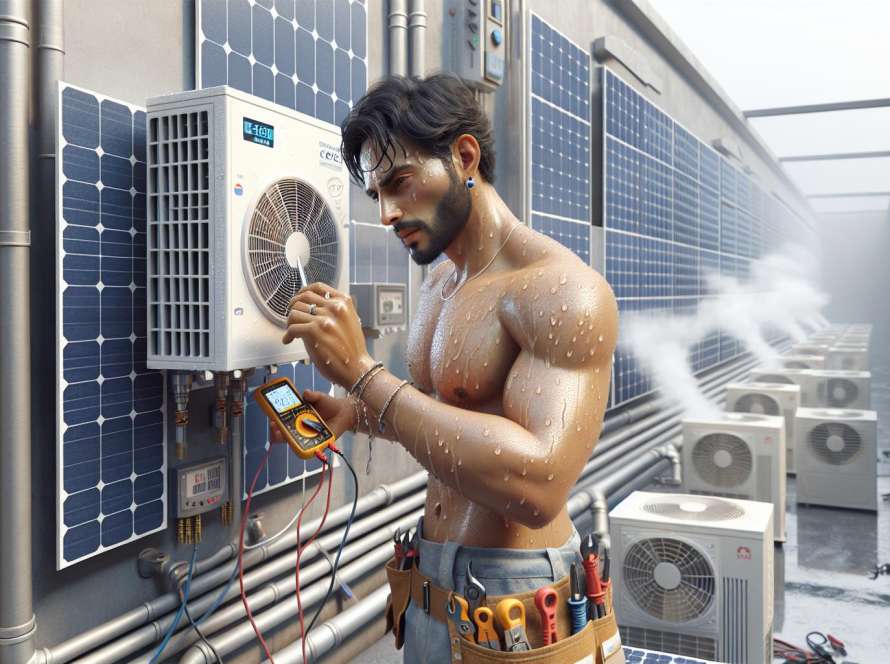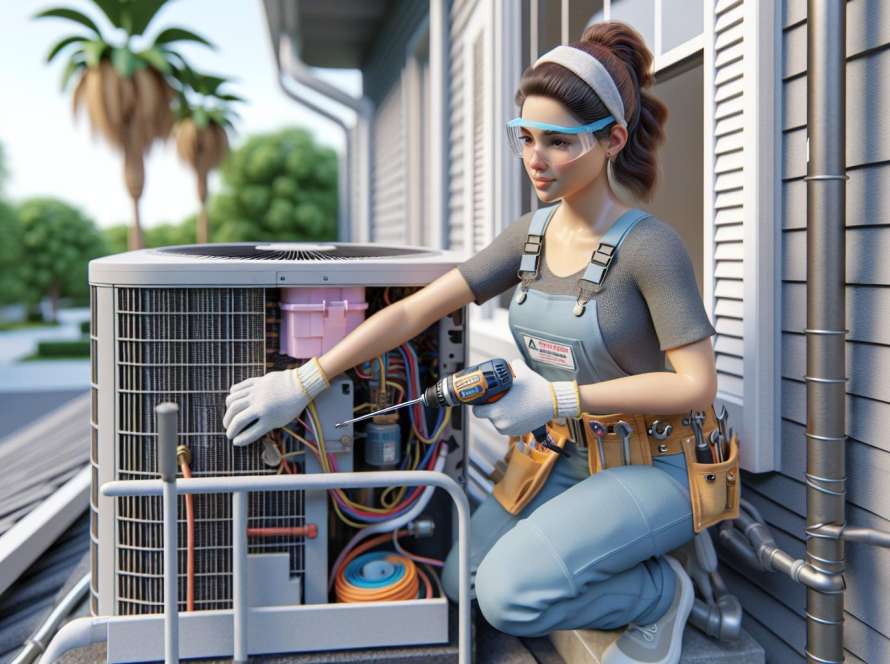So, you’re looking to beat the Florida heat and humidity by ensuring your AC is performing at its best. We all know how crucial a well-functioning air conditioning system is in this tropical climate. From combating the relentless humidity to maintaining a comfortable indoor environment, a top-performing AC is a must-have for us Floridians. But fear not, we’ve got you covered with expert tips and tricks to enhance your AC’s efficiency and performance, even in the most sweltering of Florida summers. Let’s dive into the world of optimizing your AC system for peak performance and maximum comfort in the Sunshine State.
Importance of a Well-Functioning AC in Florida
Living in Florida, where the heat and humidity can be unforgiving, a well-functioning air conditioning (AC) system is not just a luxury but a necessity. Here’s why ensuring your AC is in top shape matters:
For Beginners: Understanding the Basics
- Florida’s Heat: With average temperatures exceeding 90°F during summer, a functional AC is vital for indoor comfort.
- Humidity Control: AC systems help reduce humidity levels, preventing mold growth and promoting a healthier environment.
- Energy Efficiency: Properly maintained AC units consume less energy, leading to cost savings on utility bills.
For Intermediate Users: Enhanced Comfort and Performance
- Extended Lifespan: Regular maintenance can prolong the life of your AC unit, saving you from frequent replacements.
- Improved Air Quality: Clean filters and ducts ensure better air circulation, reducing allergens and pollutants indoors.
- Optimal Performance: Upgrading to a programmable thermostat allows for customized settings, enhancing comfort while conserving energy.
- Smart Technology Integration: Investing in smart thermostats and AC systems enables remote monitoring and control for maximum efficiency.
- Ductwork Inspection: Professionally sealing and insulating ducts helps minimize air leaks, optimizing airflow and cooling performance.
- Seasonal Maintenance: Scheduling bi-annual professional inspections ensures your AC is running efficiently year-round.
In Florida’s tropical climate, a well-maintained AC system is our best ally against the heat and humidity, keeping our indoor spaces comfortable and healthy.
Understanding the Impact of Humidity on AC Performance

When it comes to AC performance in humid Florida, understanding the impact of humidity is crucial. High humidity levels can make it challenging for your AC system to effectively cool and dehumidify the air, leading to discomfort and inefficient operation. Here’s a breakdown of how humidity affects your AC system at different experience levels:
For Beginners: Grasping the Basics
- Humidity levels: Start by monitoring indoor humidity levels using a hygrometer.
- Condensation: Learn how high humidity can cause excessive condensation on windows and surfaces.
- Air quality: Understand that high humidity fosters mold and mildew growth, affecting indoor air quality.
- AC setting: Set your AC to fan mode to improve air circulation and humidity control.
For Intermediate Users: Enhancing AC Efficiency
- Dehumidification: Invest in an AC unit with dehumidification features to tackle high humidity levels.
- Ventilation: Ensure proper ventilation in your home to reduce humidity levels.
- Insulation: Improve insulation to prevent warm, humid air from infiltrating your space.
- Regular maintenance: Schedule bi-annual AC maintenance to keep your system running efficiently.
- Smart thermostats: Utilize smart thermostats with humidity control settings for precise climate management.
- Ductwork inspection: Conduct regular ductwork inspections to prevent air leaks and humidity infiltration.
- Whole-house dehumidifiers: Consider installing whole-house dehumidifiers for comprehensive humidity control.
- Professional services: Consult with HVAC professionals for tailored solutions and advanced humidity management strategies.
By grasping the impact of humidity on AC performance and implementing these actionable tips, you can optimize your system for Florida’s humid climate. Remember, maintaining optimal indoor comfort and energy efficiency hinges on effectively managing humidity levels in your living space.
Tips to Improve AC Efficiency in a Humid Climate
For Beginners: Mastering the Basics
- Monitor Humidity Levels: Invest in a hygrometer to track indoor humidity levels.
- Address Condensation Issues: Check for water pooling around AC vents and windows.
- Improve Air Quality: Regularly change filters to enhance airflow and reduce moisture buildup.
For Intermediate Users: Enhancing Your System
- Invest in Dehumidification Features: Consider AC units with built-in dehumidifiers for better moisture control.
- Ensure Proper Ventilation and Insulation: Seal any gaps or leaks to prevent warm, humid air from entering your space.
- Schedule Regular Maintenance: Keep your AC system in top shape by scheduling routine inspections and cleanings.
- Consider Smart Thermostats: Opt for thermostats that can adjust humidity levels based on preferences and outdoor conditions.
- Explore Whole-House Dehumidifiers: Install whole-house dehumidification systems for comprehensive moisture management.
- Upgrade to Energy-Efficient Models: Invest in high-efficiency AC units to save on energy costs and enhance overall performance.
| Statistic | Data |
|---|---|
| Average Relative Humidity in Florida | 75-90% |
| Potential Energy Savings with Smart Thermostats | Up to 10-12% |
| Increase in AC Efficiency with Proper Insulation | 20-30% |
Continuously optimizing your AC system for Florida’s humid climate ensures a comfortable and energy-efficient indoor environment.
Regular Maintenance for Optimal AC Performance
When it comes to keeping your AC running smoothly in Florida’s humid climate, regular maintenance plays a crucial role. Whether you’re a novice or an HVAC pro, following a maintenance routine will help ensure your system operates efficiently. Here’s a breakdown based on varying levels of expertise:
For Beginners: Getting Started
- Change air filters regularly to prevent dirt buildup.
- Clean the outdoor unit to ensure proper airflow.
- Check thermostat settings to optimize cooling.
For Intermediate Users: Maintenance Essentials
- Inspect ductwork for leaks to avoid energy wastage.
- Clean evaporator and condenser coils to improve performance.
- Monitor refrigerant levels for optimal cooling.
- Schedule professional tune-ups annually to catch issues early.
- Consider duct sealing to enhance efficiency.
- Upgrade to energy-efficient equipment for long-term savings.
By incorporating these maintenance practices into your AC care routine, you can optimize performance and efficiency, ensuring cool comfort even in Florida’s humidity.
Benefits of Upgrading to a High-Efficiency AC System

When it comes to enhancing your air conditioning system’s performance in Florida’s humid climate, upgrading to a high-efficiency AC system can offer a range of advantages. Whether you’re a beginner looking to increase comfort or an expert aiming to optimize energy savings, investing in a more advanced system can be beneficial. Let’s explore the benefits based on different experience levels:
For Beginners: Enhanced Comfort and Ease of Use
- Increased Energy Efficiency: A high-efficiency AC system can provide greater comfort while reducing energy consumption, resulting in lower utility bills.
- Consistent Cooling: Enjoy a more stable indoor temperature, reducing humidity levels and creating a comfortable living environment.
- User-Friendly Features: Many high-efficiency systems come with intuitive controls and smart technology, making it easier for beginners to operate and maintain.
For Intermediate Users: Improved Air Quality and Long-Term Savings
- Advanced Filtration: High-efficiency systems often include superior air filtration, helping to remove allergens and pollutants from the air for better indoor air quality.
- Long-Term Savings: While the initial investment may be higher, a high-efficiency system can lead to significant cost savings over its lifespan through lower energy consumption and fewer repairs.
- Programmable Features: Take advantage of programmable settings and energy-saving modes to customize your cooling preferences and save even more on energy costs.
- Smart Integration: High-efficiency AC systems can be integrated with smart home systems, allowing for remote monitoring and control for ultimate convenience.
- Environmentally Friendly: Reduce your carbon footprint with a greener and more eco-friendly system that meets higher energy efficiency standards.
- Advanced Performance: Experience top-of-the-line cooling performance with innovative features designed for maximum efficiency and comfort.
By upgrading to a high-efficiency AC system, you can not only enhance your cooling experience but also contribute to energy conservation and environmental sustainability in Florida’s unique climate. Whether you’re a beginner, an intermediate user, or an expert, the benefits of a high-efficiency system are worth exploring for long-term comfort and efficiency.
Conclusion
Upgrading to a high-efficiency AC system in Florida’s humid climate is a smart choice for optimizing comfort, energy savings, and environmental impact. With enhanced cooling capabilities, improved air quality, and advanced features, investing in a high-efficiency system allows us to enjoy a more comfortable living environment while reducing energy costs. By choosing a system that is tailored to Florida’s unique climate needs, we can ensure consistent performance and long-term savings. Make the switch today to experience the benefits of a high-efficiency AC system in humid Florida.

